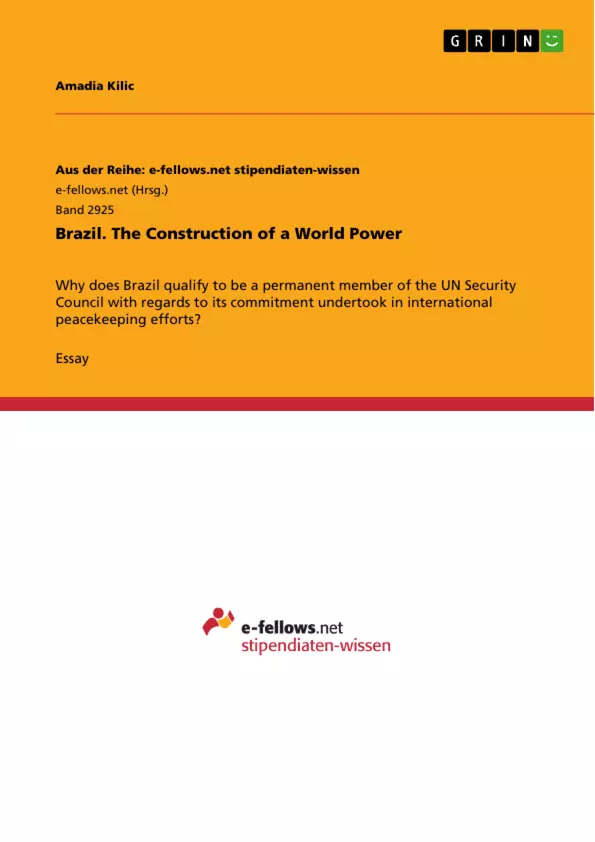A permanent seat in the UN Security Council is not only associated with political power, but also international prestige, for which reasons being a member has been one of Brazil’s foreign policy goals since its creation. One way to attain this objective has been through engagement in UN peacekeeping operations. Contemplating both, Brazil’s aim of being a permanent member in the Council, and a country’s efforts international peacekeeping missions rendering it eligible for the attainment of such a position, reveal the importance of examining Brazil’s past peacekeeping missions. After outlining several conceptions of peacekeeping missions, this analysis evaluates Brazil's engagement in international peacekeeping missions which is an imperative factor for becoming a permanent member of the UN Security Council.
Inhaltsverzeichnis (Table of Contents)
- Brazil: The Construction of a World Power
- The Debate on Peacekeeping Missions
- Approaches to Implementing Human Rights
- Relevant UN Charter Articles
- Brazilian Peacekeeping Missions
- Before the Military Regime
- After the Military Regime
- Itamar Franco
- Fernando Henrique Cardoso
- UNAVEM III in Angola
- UNAMET in East Timor
Zielsetzung und Themenschwerpunkte (Objectives and Key Themes)
This text analyzes Brazil's engagement in UN peacekeeping operations, aiming to understand its commitment to international peace and security and its potential to become a permanent member of the UN Security Council. The text explores various aspects of Brazil's peacekeeping involvement, including its historical contributions, motivations, and challenges.
- Brazil's ambition to become a permanent member of the UN Security Council
- The role of peacekeeping missions in achieving international peace and security
- Different approaches to implementing Human Rights in UN peacekeeping missions
- The distinction between Chapter VI and Chapter VII peacekeeping missions
- Analysis of specific Brazilian peacekeeping missions in different contexts
Zusammenfassung der Kapitel (Chapter Summaries)
The text begins by outlining the different conceptions of peacekeeping missions and their underlying principles, particularly focusing on the protection and promotion of Human Rights. It then explores various approaches to implementing Human Rights in UN peacekeeping missions, highlighting the importance of multidimensional peacekeeping, local consent, and the right personnel. The text then examines the relevant UN Charter articles, specifically Chapters VI and VII, outlining their implications for the nature of peacekeeping missions. This analysis provides a foundation for understanding Brazil's own peacekeeping involvement.
The text then proceeds to chronologically examine Brazil's peacekeeping efforts, dividing the analysis into two parts: before and after the military regime. It highlights the early involvement of Rui Barbosa in the Peace Conference in The Hague and Brazil's participation in the first UN peacekeeping mission in 1965 on the Sinai Peninsula. It then discusses Brazil's involvement in peacekeeping missions under the governments of Itamar Franco, Fernando Henrique Cardoso, and Luiz Inácio Lula da Silva.
The text focuses on two specific cases: UNAVEM III in Angola, where Brazil was a major troop contributor, and UNAMET in East Timor, where Brazil played a crucial role in helping the country achieve independence. These case studies illustrate the complexity and challenges of Brazilian peacekeeping involvement.
Schlüsselwörter (Keywords)
Key terms and concepts discussed in this text include: UN peacekeeping missions, international peace and security, Human Rights protection and promotion, Chapter VI and Chapter VII of the UN Charter, Brazil's foreign policy objectives, permanent membership of the UN Security Council, multidimensional peacekeeping, local consent, national interests, and specific case studies such as UNAVEM III in Angola and UNAMET in East Timor.
Frequently Asked Questions
Why is Brazil's involvement in UN peacekeeping missions important for its foreign policy?
Engagement in peacekeeping is a key factor for Brazil's ambition to secure a permanent seat on the UN Security Council, as it demonstrates commitment to international security and increases prestige.
What is the difference between Chapter VI and Chapter VII UN missions?
The text distinguishes between these chapters to explain the legal nature and rules of engagement for different types of peacekeeping operations.
Which specific Brazilian peacekeeping missions are analyzed in the text?
The analysis focuses on UNAVEM III in Angola and UNAMET in East Timor, alongside historical involvement like the Sinai Peninsula mission in 1965.
How has Brazil's peacekeeping policy changed after the military regime?
The text examines shifts in policy under presidents like Itamar Franco, Fernando Henrique Cardoso, and Lula da Silva, highlighting a move towards multidimensional peacekeeping.
What role did Brazil play in East Timor's independence?
Through the UNAMET mission, Brazil played a crucial role in supporting the process that led to East Timor achieving its independence.
- Quote paper
- Amadia Kilic (Author), 2016, Brazil. The Construction of a World Power, Munich, GRIN Verlag, https://www.grin.com/document/448488



